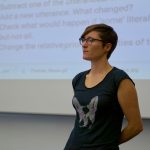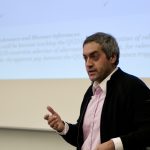On July 11-13, 2018 the workshop “Scalar Implicatures: Formal and Experimental Exploration” will take place at the University of Siena, Italy. The workshop is organized by XPrag.de associate Salvatore Pistoia-Reda (ZAS Berlin, U Siena), XPrag.de coordinator Uli Sauerland (ZAS Berlin), XPrag.de associate Filippo Domaneschi (U Genoa for XPRAG.it) and Valentina Bianchi (U Siena). Deadline for submissions is May 1st, 2018. More details and the call for papers can be found here!
Events
Talk by XPrag.de member Cornelia Ebert at ZAS Berlin
On November 15th, at 3:30 p.m. XPrag.de member Cornelia Ebert from project “PSIMS” at ZAS Berlin will give a talk on “Temporal sequence and information status” (with special attention on the interplay of gesture and speech) at ZAS Berlin, room 403.
Abstract:
The temporal sequence of verbal expressions as well as the temporal alignment of gesture and speech is decisive for the information status of the involved expressions. It is by now established that, while appositives are generally seen as contributing non-at-issue, sentence-final appositive clauses are much easier to be interpreted at-issue than sentence-medial ones (AnderBois et al. 2014; Koev2013). Similarly, the temporal synchronization of gesture and speech is not without consequences (cf.Esipova 2017). I will argue that while co-speech gestures are non-at-issue by default (Ebert & Ebert 2014; Schlenker 2016), post-speech gestures are more likely to be interpreted at issue (pace Schlenker 2016). I propose a continuous scale of self-contained gesture interpretation: gestures that have their own time slot are interpreted at issue; the less they are synchronized with speech the more likely it is that they will be interpreted as at issue material(cf. Kendon’s continuum, Kendon 1980). Furthermore I will discuss the possibility and systematic means to shift information from the non-at-issue dimension to the at-issue dimension and vice versa. I will focus my attention on the relationship between gesture and speech and argue that language provides different means of initiating dimension shifting.
Judith Degen from project “Pro^3” is co-organizing the workshop “Sociolinguistic, Psycholinguistic and Formal Perspectives on Meaning” in Paris in July 2018.
@hburnett and i are organizing a workshop on social meaning in paris in july — submit abstracts by jan 15! https://t.co/70f6SbhMIx
— Judith Degen (@thegricean) 24. Oktober 2017
Talk by XPrag.de coordinator Petra Schumacher at “Meaning in FLUX 2017” at Yale University
On Thursday, 12th 2017, XPrag.de coordinator Petra Schumacher (U Cologne) will give a talk with the title “Do different types of cognitive effects reflect the diachronic stage of use conditions?” at the conference “Meaning in flux: connecting development, variation, and change”, which will take place at Yale University, New Haven, CT on October 12th-14th, 2017.
An impressive number of XPrag.de members presenting at the Kick-off-Workshop “Cognitive Semantics and Quantities” in Amsterdam
There are several XPrag.de members presenting at the Kick-off workshop of the recently started ERC project on “Cognitive Semantics and Quantities”, which is leaded by Jakub Szymanik, who is an Associate professor in the “Institute for Logic, Language and Computation” at the University of Amsterdam. The workshop will be held on September 28th and 29th. More details can be found here: http://www.jakubszymanik.com/CoSaQ/events/kick-off-workshop/.
On Thursday, September 28 at 11:40 XPrag.de associate Stephanie Solt (ZAS Berlin) will give a talk with the title “Do quantifiers count?”. In the afternoon at 14:40, XPrag.de Mercator Fellow Napoleon Katsos (Cambridge University) will talk on “How children learn `some,’ `all,’ and `most,’ words”, followed by XPrag.de Principal Investigator Olivier Bott from project “CiC” in Tübingen, who will talk about “Empty-Set Effects in Quantifier Interpretation” at 14:40.
On Friday, 29th at 14:40, XPrag.de Principal Investigator Maria Spychalska from project “ImpliPer” at the University of Cologne will talk on “Pragmatic effects on the processing of quantifiers.” Afterwards, XPrag.de member Barbara Tomaszewicz from project “InfoPer” in Cologne will give a talk on “Proportional and Superlative ‘Most’ in Visual Verification Tasks”
Exciting XPrag.de week 2017 in Cologne
The University of Cologne hosted the annual XPrag.de meeting on September 18th and 19th followed by a three-day methods workshop in Experimental Pragmatics. This year’s meeting was special because it was the final meeting of the first phase our program and at the same time the kick-off for the second phase. Project groups of the first phase have presented their remarkable results while the projects of the second phase have introduced their plans for the next three years resulting in a total of 12 talks and 15 posters. The meeting was opened with an exciting talk by first phase’s mercator fellow Jesse Snedeker (Harvard University) titled “Where does recursion come from? Evidence from an emerging sign language“. A second invited talk was given by Kai Vogeley on “Neural Mechanisms of Intersubjectivity“. On Tuesday afternoon, the Programme Director Humanities and Social Sciences 2: Social and Behavioural Sciences of the German Research Foundation (DFG) Helga Weyerts-Schweda gave an overview of the funding opportunities offered by the DFG. Overall, these were two busy days with exciting presentations and many fruitful discussions leading to first plans for collaboration between various XPrag.de projects.
The second half of the week featured a methods workshop on new developments in experimental methods and their links to pragmatic theory. More specifically, XPrag.de member Judith Degen (Stanford University) gave an introductory course on “Probabilistic pragmatics and the Rational Speech Act framework”. XPrag.de Mercator Fellow Lyn Frazier (U Mass Amherst) gave a series of lectures on language processing, in particular the processing of non-at-issue content and the pragmatics of ellipsis among others. The third course held by XPrag.de Mercator Fellow Napoleon Katsos (University of Cambridge) addressed the acquisition of pragmatic competence. The workshop slides can be found here. A further event was an interactive workshop on gender and diversity in academia to prepare researches for related challenges in their role as principal investigator or professor held by Monika Schoop (U Cologne). The methods workshop was a great success attracting more than 50 attendees from all across Europe.
XPrag.de at the “Fourth Philosophy of Language and Mind Conference (PLM4)” in Bochum
There will be several presentations by XPrag.de members at the “Fourth Philosophy of Language and Mind Conference (PLM4)”, which is organized among others by XPrag.de Principal Investigator Markus Werning from project “BayesPrag@EEG” at Ruhr Universität Bochum and which will take place from September 21st to September 23rd, 2017.
On September 21st at 12:00 pm, XPrag.de member Matthias Unterhuber from project “BayesPrag@EEG” in Bochum will talk on “A Mechanistic Take on the Theory Theory of Concepts”. At the same time XPrag.de Principal Investigator Maria Spychalska from project “ImpliPer” in Cologne will give a talk together with Viviana Haase, J. Kontinen and Markus Werning with the title “Processing of affirmation and negation in contexts with unique and multiple alternatives: Evidence from event-related potentials”.
In the afternoon at 16:35 pm, XPrag.de associate Salvatore Pistoia-Reda and XPrag.de coordinator Uli Sauerland (ZAS Berlin) will talk on “Degrees of Analyticity”.
At 18:15 pm, Markus Werning and Erica Cosentino will give the keynote talk on “The Interaction of Bayesian Pragmatics and Lexical Semantics in Sentence Meaning Composition”.
On September 23rd at 13:05 pm, Maria Spychalska will give another talk on “Neurocognitive evidence in the semantics-pragmatics interface debate: the case of implicatures”.
XPrag.de member Michael Franke will teach at the DGfS-CL Fall School 2017 in Düsseldorf
XPrag.de principal investigator Michael Franke from the projects “Pro^3” and “MUQTASP” will give a course together with Michael Henry Tessler (Stanford University) on “Computational Pragmatics” at the DGfS-CL Fall School 2017 to be held Septmember 11-22nd, 2017 at heinrich-Heine-Universität Düsseldorf.
XPrag.de at SuB 22 at ZAS Berlin and Potsdam University
There will be several presentations by XPrag.de members at the “Sinn und Bedeutung 22” conference, which is organized by XPrag.de associate Stephanie Solt (ZAS Berlin), XPrag.de coordinator Uli Sauerland, XPrag.de Principal Investigator Malte Zimmermann (Potsdam), XPrag.de Principal Investigator Manfred Krifka (ZAS) together with Guillermo Del Pinal (ZAS) and Mira Grubic (Uni Potsdam). The conference will be hosted by the Leibniz-Zentrum Allgemeine Sprachwissenschaft (ZAS) Berlin and the Linguistics Department of the University of Potsdam.
At the poster session on Friday afternoon (14:15-16:00), XPrag.de member A. Marlijn Meijer from project “YesNo” in Cologne will present a poster on “The pragmatics of embedded propositional proforms: embedding it, that and the NCA”. There will also be a poster by Anton Benz, Lisa Raithel and Nicole Gotzner from project “SiGames” at ZAS Berlin on “Embedded implicature: What can be left unsaid?” A further poster will be presented by XPrag.de associate Stefan Hinterwimmer (Cologne) and XPrag.de member Cornelia Ebert from project “PSIMS” at ZAS Berlin on “A comparison of the modal particles fei and aber“.
Afterwards, at 17:40 pm, Anton Benz, Carla Bombi Ferrer and Nicole Gotzner will give a talk on “Scalar diversity and negative strengthening”.
First Italian conference on Experimental Pragmatics this weekend!
This weekend (June 10/11), the first Italian conference on Experimental Pragmatics “XPRAG.it – Behavioral and Neural Evidence on Pragmatic Processing” organized by XPrag.de associate Filippo Domaneschi from project EXPRESS together with Valentina Bambini (IUSS) will take place in Genoa. XPrag.de Mercator Fellow Ira Noveck will be keynote speaker. More info can be found here: http://xpragit.weebly.com



